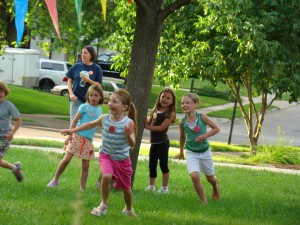Let Them Play for Academic Success
Did you know the United Nations has actually stated that “every child has the right to play”? I don’t disagree, but I would go a step further. More than simply a “right” to play, our children have a biological need to play; and parents have an intuitive desire of their children’s need to play.
Why do children “need” to play? Because play promotes healthy development. A review of the research suggests that play helps children develop knowledge and understanding through hands-on activities. It increases their attention span and their productivity, both of which benefit their academic success.
The same review revealed that play helps our children develop emotionally and socially as well. Play allows them to practice social skill like cooperation, communication, sharing, and problem-solving. It allows them to role-play, safely experimenting with their identity development. And it provides a safe and effective avenue for relieving and managing stress. One child development expert even said that play “makes a child a head taller than himself” in regard to maturity.
The researchers of this review also noted that play helps children develop movement and motor skills. Physical, social, emotional, and mental development—play helps in all these areas.
Another interesting study about play published in 2011 explored the impact of an afterschool physical activity program for 170 seven- to eleven-year-old children. They discovered that physical activity (AKA-play), improved the children’s “cognitive performance.” In other words, physical activity led to greater academic success. In addition, those who engaged in 40 minutes of activity did better than those engaged in only 20 minutes of activity.
What does this all mean for our families? Quite simply, if you want your children to achieve to their full potential in school, let them have time to play with other children. Sure, academics is important. But if you want your children to focus better during school, perform better in the classroom, and develop better thinking skills, encourage them to play. Let your children play so they can have greater academic success. And, as an added bonus, spend some time wisely playing with them. You’ll both love it!

-0 Comment-